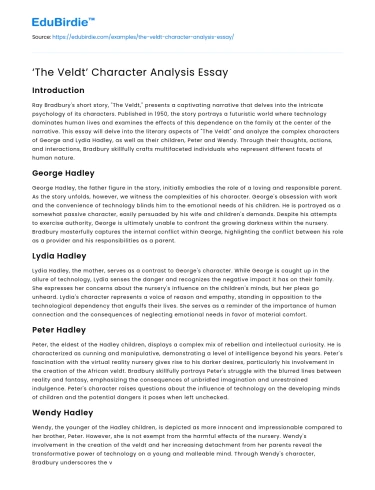Introduction
Ray Bradbury's short story, "The Veldt," presents a captivating narrative that delves into the intricate psychology of its characters. Published in 1950, the story portrays a futuristic world where technology dominates human lives and examines the effects of this dependence on the family at the center of the narrative. This essay will delve into the literary aspects of "The Veldt" and analyze the complex characters of George and Lydia Hadley, as well as their children, Peter and Wendy. Through their thoughts, actions, and interactions, Bradbury skillfully crafts multifaceted individuals who represent different facets of human nature.
George Hadley
George Hadley, the father figure in the story, initially embodies the role of a loving and responsible parent. As the story unfolds, however, we witness the complexities of his character. George's obsession with work and the convenience of technology blinds him to the emotional needs of his children. He is portrayed as a somewhat passive character, easily persuaded by his wife and children's demands. Despite his attempts to exercise authority, George is ultimately unable to confront the growing darkness within the nursery. Bradbury masterfully captures the internal conflict within George, highlighting the conflict between his role as a provider and his responsibilities as a parent.
Save your time!
We can take care of your essay
- Proper editing and formatting
- Free revision, title page, and bibliography
- Flexible prices and money-back guarantee
Lydia Hadley
Lydia Hadley, the mother, serves as a contrast to George's character. While George is caught up in the allure of technology, Lydia senses the danger and recognizes the negative impact it has on their family. She expresses her concerns about the nursery's influence on the children's minds, but her pleas go unheard. Lydia's character represents a voice of reason and empathy, standing in opposition to the technological dependency that engulfs their lives. She serves as a reminder of the importance of human connection and the consequences of neglecting emotional needs in favor of material comfort.
Peter Hadley
Peter, the eldest of the Hadley children, displays a complex mix of rebellion and intellectual curiosity. He is characterized as cunning and manipulative, demonstrating a level of intelligence beyond his years. Peter's fascination with the virtual reality nursery gives rise to his darker desires, particularly his involvement in the creation of the African veldt. Bradbury skillfully portrays Peter's struggle with the blurred lines between reality and fantasy, emphasizing the consequences of unbridled imagination and unrestrained indulgence. Peter's character raises questions about the influence of technology on the developing minds of children and the potential dangers it poses when left unchecked.
Wendy Hadley
Wendy, the younger of the Hadley children, is depicted as more innocent and impressionable compared to her brother, Peter. However, she is not exempt from the harmful effects of the nursery. Wendy's involvement in the creation of the veldt and her increasing detachment from her parents reveal the transformative power of technology on a young and malleable mind. Through Wendy's character, Bradbury underscores the vulnerability of children to the seductive allure of technology and the potential consequences when their emotional needs are neglected.
Conclusion
In "The Veldt," Ray Bradbury skillfully crafts a cast of complex characters who represent different aspects of human nature and the consequences of uncontrolled technological dependency. Through the character analysis of George, Lydia, Peter, and Wendy, we witness the multifaceted dynamics within the Hadley family and the psychological toll of their reliance on the virtual reality nursery. The characters serve as cautionary examples, reflecting the dangers of neglecting emotional connections in favor of technological convenience. "The Veldt" serves as a timeless reminder of the importance of maintaining a balance between technological advancements and human relationships, urging readers to contemplate the potential ramifications of our increasing dependence on technology in the modern world.






 Stuck on your essay?
Stuck on your essay?

